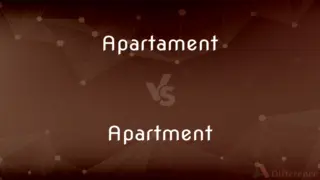Addressess vs. Addresses — Which is Correct Spelling?
By Tayyaba Rehman — Updated on March 22, 2024
"Addressess" is incorrect; the right spelling is "addresses." Addresses are locations or the act of speaking to someone.

Table of Contents
Which is correct: Addressess or Addresses
How to spell Addresses?

Addressess
Incorrect Spelling

Addresses
Correct Spelling
ADVERTISEMENT
Key Differences
"Address" + "es" equals "addresses."
Think of it as the word "address" with an extra "es" at the end.
Remember only one "s" between the two "e" letters in "addresses."
Say it aloud: "ad-dress-es" and notice the three distinct parts.
Recollect a place with two doors ("double door" for the double "d" in "address") but only one sign (single "s" between the "e" letters).
ADVERTISEMENT
How Do You Spell Addresses Correctly?
Incorrect: He had to update his contact addressess.
Correct: He had to update his contact addresses.
Incorrect: The database contained old addressess for clients.
Correct: The database contained old addresses for clients.
Incorrect: Finding addressess in the city can be challenging.
Correct: Finding addresses in the city can be challenging.
Incorrect: She wrote down the wrong addressess on the invitations.
Correct: She wrote down the wrong addresses on the invitations.
Incorrect: Multiple addressess were listed for the company.
Correct: Multiple addresses were listed for the company.
Addresses Definitions
"Addresses" are the particulars of the place where someone lives or an organization is located.
She has multiple addresses in various cities.
"Addresses" can be the manner in which a person behaves, especially in a particular place or situation.
Her addresses in official meetings is always professional.
"Addresses" can be the act of speaking or writing remarks or a protest to someone.
He addresses the crowd with confidence.
In computing, "addresses" are locations in memory where data is stored.
Each byte in memory has unique addresses.
"Addresses" can also be the act of thinking about or dealing with a particular topic or issue.
The book addresses the issue of poverty in rural areas.
To speak to
Addressed me in low tones.
To make a formal speech to
Addressed the union members at the convention.
To call (a person to whom one is speaking) by a particular name or term
Address the judge as "Your Honor.".
To direct (a spoken or written message) to the attention of
Address a protest to the faculty senate.
To mark with a destination
Address a letter.
To direct the efforts or attention of (oneself)
Address oneself to a task.
To begin to deal with
Addressed the issue of taxes.
To dispatch or consign (a ship, for example) to an agent or factor.
(Sports) To adjust and aim the club at (a golf ball) in preparing for a stroke.
A description of the location of a person or organization, as written or printed on mail as directions for delivery
Wrote the address on the envelope.
The location at which a particular organization or person may be found or reached
Went to her address but no one was home.
A name or a sequence of characters that designates an email account or a specific site on the internet or other network.
A name or number used in information storage or retrieval assigned to or identifying a specific memory location.
A formal speech or written communication.
Often addresses Courteous attentions.
The manner or bearing of a person, especially in conversation.
Skill, deftness, or grace in dealing with people or situations
"With the charms of beauty she combined the address of an accomplished intriguer" (Charles Merivale).
Plural of address
Addresses Meaning in a Sentence
Businesses often have multiple addresses for different departments.
Online shopping requires customers to enter their shipping addresses.
Make sure to write addresses clearly on your letters.
Addresses are necessary for sending mail and packages.
GPS devices use addresses to provide directions.
Emergency services need accurate addresses to respond quickly.
Doctors' offices ask for addresses to send appointment reminders.
Companies sometimes use virtual addresses for mail forwarding.
Bank accounts require addresses for billing and communication.
Event venues provide addresses for guests to find their locations.
Cultural landmarks often have well-known addresses that are tourist attractions.
Utility companies require addresses to set up services.
Addresses can include apartment or suite numbers for specific delivery.
Real estate listings include addresses so potential buyers can visit.
Social media profiles often include email addresses for contact.
Schools use student addresses to send important information home.
Tourists use hotel addresses to find their accommodations.
Addresses help in organizing local delivery routes for businesses.
Government agencies keep records of citizens' addresses for various purposes.
Addresses are used to calculate delivery times and costs.
Online maps allow users to search for businesses by their addresses.
Common Curiosities
What is the pronunciation of Addresses?
It's pronounced as /əˈdrɛsɪz/.
What is the verb form of Addresses?
The verb form is "address."
Which vowel is used before Addresses?
The vowel "e" is used before the last "s" in "addresses."
What is the singular form of Addresses?
The singular form is "address."
What is the plural form of Addresses?
The plural form is "addresses."
What is the root word of Addresses?
The root word is "address."
Is Addresses a negative or positive word?
It is neutral; neither inherently positive nor negative.
Which conjunction is used with Addresses?
No specific conjunction is uniquely paired with "addresses."
Why is it called Addresses?
It's called "addresses" because it's derived from the act of directing one's attention or the particulars of a place's location.
Which preposition is used with Addresses?
"At" and "to" are common prepositions used with addresses.
Is Addresses an adverb?
No, it's not an adverb.
Is Addresses a collective noun?
No, it's not a collective noun.
Is the word Addresses is Gerund?
No, it's not a gerund.
Which determiner is used with Addresses?
"These," "those," "many," or "several" can be used, among others.
What is the first form of Addresses?
The first form is "address."
Is Addresses a noun or adjective?
"Addresses" is a noun.
Is Addresses an abstract noun?
No, it's a concrete noun.
Is Addresses a countable noun?
Yes, you can have one address or multiple addresses.
Is the word Addresses is imperative?
No, it's not an imperative form.
Is the word “Addresses” a Direct object or an Indirect object?
It can be used as a direct object, depending on the sentence.
How do we divide Addresses into syllables?
Ad-dress-es.
What part of speech is Addresses?
It is a noun.
What is the second form of Addresses?
As "address" is a verb, its second form (past simple) is "addressed."
How many syllables are in Addresses?
There are three syllables.
What is a stressed syllable in Addresses?
The second syllable "dress" is stressed.
What is another term for Addresses?
Locations or destinations.
What is the opposite of Addresses?
There isn't a direct opposite, but in terms of communication, "ignores" could be an antonym.
What is the third form of Addresses?
The third form (past participle) is "addressed."
Which article is used with Addresses?
Both "the" and "an" can be used with "address," depending on the context.
Is Addresses a vowel or consonant?
"Addresses" is a word containing both vowels and consonants.
Is the Addresses term a metaphor?
Not inherently, but it could be used metaphorically.
How is Addresses used in a sentence?
"She sent out invitations to all her friends' addresses."
Share Your Discovery

Previous Comparison
Apartament vs. Apartment
Next Comparison
Paleoscene vs. PaleoceneAuthor Spotlight
Written by
Tayyaba RehmanTayyaba Rehman is a distinguished writer, currently serving as a primary contributor to askdifference.com. As a researcher in semantics and etymology, Tayyaba's passion for the complexity of languages and their distinctions has found a perfect home on the platform. Tayyaba delves into the intricacies of language, distinguishing between commonly confused words and phrases, thereby providing clarity for readers worldwide.


































